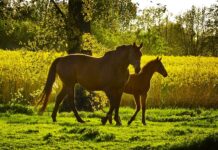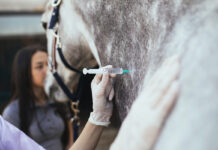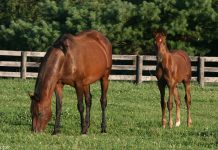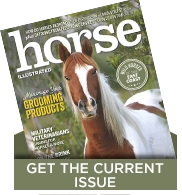1. Most horses benefit from free-choice access to forage, preferably grass hay or non-irrigated pasture.
3. Lack of dental care, including regular floating, results in less efficient chewing of food.
4. Store hay off the ground to prevent mold, and protect it from the elements to maintain nutritional value.
5. If your pastures don’t offer the nutrition your horses need, supplement them with additional rations after consulting your veterinarian.
6. Feed changes should be introduced slowly over several weeks.
7. Deworm on a regular basis—don’t let parasites rob your horse of nutrients.
8. Vaccinate: Even the healthiest of horses that receive the best nutrition can’t fend off all disease.
9. Feed by weight, not volume.
10. Invest in the best watering system you can. Clean, unfrozen water (and plenty of it) is vital to good digestive function.
11. Ask your veterinarian to perform a wellness exam on your horse every year. Your vet can suggest dietary recommendations based on your horse’s current weight and exercise routine.
12. Keep horses prone to founder off grass high in sugars. Don’t be fooled: Brown grass can be just as deadly as the lush green variety.
13. To prevent obesity, make sure your horse receives regular exercise including daily turnout. 24/7 turnout is optimal, but beware of excess nutrients from pasture.
14. Rather than increasing grain rations for weight gain or added energy, up your horse’s forage ration and ask your veterinarian about the benefits of fat supplementation.
15. If your senior horse has trouble chewing, talk to your veterinarian about feeding soaked hay pellets and soaked beet pulp pellets along with a senior feed product.
16. If you keep horses together, keep an eye on those at the bottom of the pecking order to ensure they’re getting their fair share of food.
17. When supplementing your horse’s diet, follow product label directions.
18. Even if your horse is an easy keeper, he still needs his forage ration. If obesity is an issue, consider slowly switching out rich calorie-dense hay, such as alfalfa, for grass hay.
19. Just because a horse has a “hay belly” doesn’t necessarily mean he’s fat. Health problems can contribute to a pot-bellied appearance.
20. During cold weather, increase your horse’s hay rations to help keep him warm and to fend off weight loss.
21. Regularly remove blankets to inspect and feel through the hair to see if your horse is staying in good flesh.
22. Pregnant and nursing mares, as well as foals and young horses, need special diets, so work with your veterinarian to make sure their nutritional needs are met.
23. If you feed your horse treats, remember that moderation is key.
24. Feeding smaller meals several times a day is preferred over a twice-daily feeding routine of large amounts.
25. If your horse is too lazy or too hyper, talk to your veterinarian about feed changes to modify energy levels.
26. Even if your horse is obese, he will need a minimum of 12 – 15 pounds of forage daily, depending on his size and activity. Weight loss should be done gradually rather than as a crash diet.
27. The recommended ratio of calcium to phosphorus in the horse’s diet ranges from 1:1 to 2:1. Any supplements that you feed should complement the calcium to phosphorus ratio in his hay and pasture.
28. Horses should have free access to an iodizing trace mineral-containing salt block.
29. Feed high-quality hay that is free from mold, dust, dirt, weeds, sticks and foreign materials.
30. If your horse suffers from any equine disease—laminitis, kidney dysfunction, HYPP, Cushing’s disease, metabolic disorders, just to name a few—a special diet is warranted. Talk to your veterinarian!







thanx
I am a firm believer in on going nutrition articles. Things change each year as well as each horse. New studies bring on new ideas.
Good info, esp. regarding the need for forage. I learned that a fat horse [potbellied] CAN be starving if on too strict a diet [1% of bodyweight/d of hay]. It’s amazing how much calmer my boy is w/almost free choice grass hay. And he’s LOSING weight.
Feeding by WEIGHT NOT VOLUME! Thank you!
What should i feed my 4 yr old qtr. sweet feed or something else?
I was told a mineral block doesn’t contain enough minerals to warrant providing it, but my horses sure so like them? Any ideas